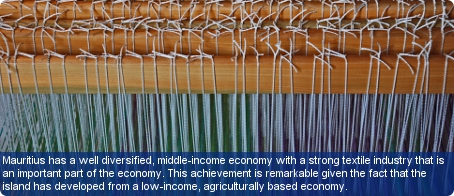Find a business in Mauritius

The island state of Mauritius has one of the most successful small developing countries in diversifying its economy away from agriculture to manufacturing and tourism. The services sector accounts for 69% of GDP, while the agriculture sector only accounts for 4% of GDP, and the financial and business sector has continued to grow due to privatisation and financial market liberalisation. Mauritius has a GNI per capita of US$8,570 (2012) and has seen a GDP growth rate of 3.9% per annum (2008-12). High levels of foreign investment in the 2000s has sustained economic growth and helped buffet the economy from fluctuations in the global economy.
Mauritius has a well diversified, upper-middle-income economy with growing industrial, financial services, and tourist sectors. This achievement is remarkable given the fact that the island has developed from a low-income, agriculturally based economy dependent on sugar. Sugarcane covers almost 90% of the cultivated land area and contributes 25% of export earnings.
The industry sector contributes 28% of GDP (2010) and the manufacturing sector is vital in terms of employment and has traditionally been dominated by textiles; however, diversification into jewellery production, optical goods manufacture, furniture making, light engineering, and electronic components manufacture and assembly has expanded the sector. Several measures have been undertaken by the government to stimulate additional investments in the manufacturing and textile sectors. The most significant action was setting corporate tax at 15%, with duty free imports of inputs and machinery, as well as free repatriation of profits.
In 2011 the direct contribution of travel and tourism to the economy of Mauritius was 12.6%, generating 67,500 jobs – 12% of total employment (World Travel and Tourism estimate). Tourism is a strong part of the economy and a major contributor to foreign exchange earnings. Mauritius, with its strong textile sector, has been well poised to take advantage of the US Africa Growth and Opportunity Act.
The government has focused on expanding the financial services sector and upon building a domestic information technology and telecommunications industry. The off-shore investment sector has attracted more than 9,000 offshore entities, many aimed at commerce in India and South Africa. Investment in the banking sector alone has reached over US$1 billion.
Mauritius has a fully modern airport, Sir Seewoosagur Ramgoolam International Airport, located in Plaisance, about 50 km away from the capital, Port Louis.
The island county is ranked as 11th best in the world for paying taxes and 13th best for protecting investors, according to the World Bank’s ‘Doing Business 2012’ study. These rankings measure the conduciveness of a regulatory regime in starting and operating a business.
Mauritius has a highly skilled bilingual (French and English) workforce, and the adult literacy rate stands at about 89.2% (2011). The country offers a young labour force, with a well-developed professional labour force, including IT, engineering, law and accounting.



